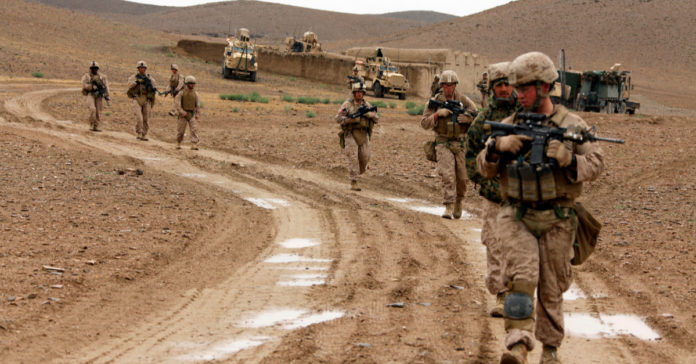The United States and the Taliban have signed a final peace deal in Qatar’s capital Doha to end the United States’s longest ever war, fought in Afghanistan since 2001.
Saturday’s agreement will pave the way for the U.S. to gradually withdraw its troops over 14 months.
The agreement has three points:
- a timeline of 14 months for the withdrawal of all U.S. and NATO troops from Afghanistan;
- a Taliban guarantee that Afghan soil will not be used as a launchpad that would threaten the security of the U.S.;
- the launch of intra-Afghan negotiations by March 10; and a permanent and comprehensive ceasefire.
In a statement, the Taliban said it had reached an agreement “about the termination of occupation of Afghanistan.”
“The accord about the complete withdrawal of all foreign forces from Afghanistan and never intervening in its affairs in the future is undoubtedly a great achievement,” it added.
Earlier on Saturday, the Taliban ordered all its fighters to halt fighting and “refrain from attacks.”
For his part, U.S. Secretary of State Mike Pompeo called on the Taliban to honour its commitments.
Subscribe to our newsletter and stay updated on the latest news and updates from around the Muslim world!
“I know there will be a temptation to declare victory, but victory for Afghans will only be achieved when they can live in peace and prosper,” he said at the Doha ceremony.
A joint statement released by the U.S. and the Afghan government said the U.S. and NATO troops would withdraw from Afghanistan within 14 months.
“The United States will reduce the number of U.S. military forces in Afghanistan to 8,600 and implement other commitments in the U.S.-Taliban agreement within 135 days of the announcement of this joint declaration and the U.S.-Taliban agreement,” the joint statement said.
It added that the Afghan government will engage with the United Nations Security Council “to remove Taliban members from sanctions list by May 29.”
About 14,000 U.S. troops and approximately 17,000 troops from 39 NATO allies and partner countries are stationed in Afghanistan in a non-combatant role.
The peace deal also proposes an intra-Afghan dialogue with the government in Kabul and the release of 5,000 Taliban members from prison.
The Taliban has so far refused to speak to the Western-backed Afghan government, saying it is a “puppet regime.”
The intra-Afghan talks are to begin on March 10 but no specific details have been given.
The Taliban now controls or holds influence over more Afghan territory than at any point since 2001 and has carried out near-daily attacks against military outposts throughout the country.
President Trump has long expressed eagerness to bring U.S. soldiers home and to end the country’s longest war as he seeks re-election in 2020.
More than 100,000 Afghans have been killed or wounded since 2009 when the UN Assistance Mission in Afghanistan began documenting casualties.
Reacting to the news advocacy group CAGE said the deal represents a full circle in policy, underlined by the fact that the Taliban negotiation team included former Guantanamo Bay detainees – once deemed “the worst of the worst.”
CAGE said: “Sadly, it took the killing of over 200 000 people in Afghanistan, programmes of mass torture and imprisonment, and the death of over 2,000 US soldiers to reach the realisation that the alleged ‘War on Terror’ was a failure and that dialogue was the way forward.”
Moazzam Begg, a former Guantanamo Bay prisoner and someone who lived in Afghanistan during the war, added: “I was held by the U.S. military in Bagram airbase in a building that was built by the USSR during its occupation of Afghanistan. The people of Afghanistan have suffered occupation by two global superpowers over four decades. The USSR met its end following its humiliating withdrawal from Afghanistan and the other, the United States, has been desperate for a way out for years. That way out has ironically been facilitated by torture survivors and former Guantanamo prisoners.
“CAGE has been attacked many times for advocating dialogue with the Taliban yet, the U.S. administration under Donald Trump has now negotiated peace with them. Hundreds of thousands of peoples lives could have been spared had the appetite for dialogue existed before. We stand proudly behind our call for dialogue and negotiations with the Taliban. It should have happened a long time ago.”






















